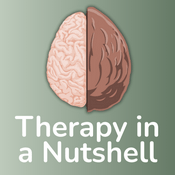Alan Gordon is the author of the Way Out, he developed and tested Pain Reprocessing Therapy as an evidence based treatment for Chronic Pain
Learn the skills to Regulate your Emotions, join the membership: https://courses.therapyinanutshell.com/membership
In this engaging conversation, Alan and I delve into the concept of neuroplastic pain, exploring how the brain can misinterpret safe signals from the body as dangerous, leading to chronic pain. One speaker shares their personal journey with chronic pain, highlighting the confusion and frustration that arises from conflicting medical opinions and the realization that many people with structural issues do not experience pain. We talk about pain as a real experience, regardless of its origin, and discuss the importance of understanding the brain's role in pain perception. The conversation also touches on the psychological aspects of pain, including how stress and anxiety can amplify pain sensations, and the significance of addressing these mental factors in pain management.
Looking for affordable online counseling? My sponsor, BetterHelp, connects you to a licensed professional from the comfort of your own home. Try it now for 10% off your first month: https://betterhelp.com/therapyinanutshell
FREE Mental Health Resources: https://courses.therapyinanutshell.com/free-resources
Therapy in a Nutshell and the information provided by Emma McAdam are solely intended for informational and entertainment purposes and are not a substitute for advice, diagnosis, or treatment regarding medical or mental health conditions. Although Emma McAdam is a licensed marriage and family therapist, the views expressed on this site or any related content should not be taken for medical or psychiatric advice. Always consult your physician before making any decisions related to your physical or mental health. In therapy I use a combination of Acceptance and Commitment Therapy, Systems Theory, positive psychology, and a bio-psycho-social approach to treating mental illness and other challenges we all face in life. The ideas from my videos are frequently adapted from multiple sources. Many of them come from Acceptance and Commitment Therapy, especially the work of Steven Hayes, Jason Luoma, and Russ Harris. The sections on stress and the mind-body connection derive from the work of Stephen Porges (the Polyvagal theory), Peter Levine (Somatic Experiencing) Francine Shapiro (EMDR), and Bessel Van Der Kolk. I also rely heavily on the work of the Arbinger Institute for my overall understanding of our ability to choose our life's direction.
And deeper than all of that, the Gospel of Jesus Christ orients my personal worldview and sense of security, peace, hope, and love https://www.churchofjesuschrist.org/comeuntochrist/believe
If you are in crisis, please contact the National Suicide Prevention Hotline at https://suicidepreventionlifeline.org or 1-800-273-TALK (8255) or your local emergency services.
Copyright Therapy in a Nutshell, LLC



